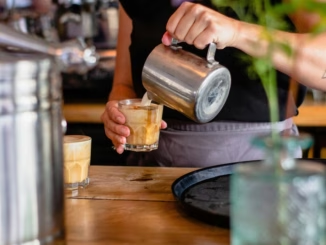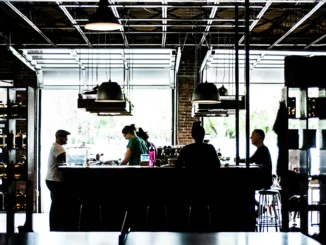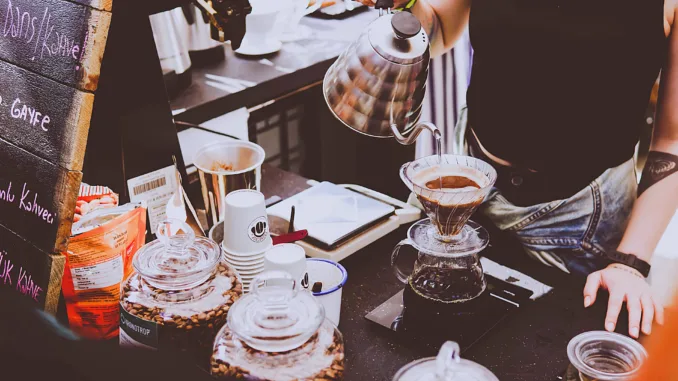
Baristas may deal with a number of safety concerns while working on bar. Today, we discuss sexual harassment—and how best to prevent it.
BY EMILY JOY MENESES
BARISTA MAGAZINE ONLINE
Featured photo by Sabri Tuzcu
I’ve worked at a number of coffee shops over the years, and one component was overlooked in the training process by virtually all of them: barista safety. I don’t mean talking about wearing non-slip shoes or operating machinery correctly (though those things are definitely important). I’m talking about less technical matters—like dealing with customer altercations or fending off sexual harassment.
In this installment of our “Let’s Talk About” series, we asked readers for their input on the topic of barista safety so we could explore the conversation from several different sides. We’ll look at how to protect employees—particularly those of marginalized identities (e.g., queer, POC, and/or femme employees)—from sexual harassment, and the role of managers/supervisors in keeping their team members safe.
Identities Vulnerable to Sexual Harassment
As a femme barista, I’ve personally experienced unwanted attention from male customers—and while anyone of any gender identity can be vulnerable to harassment, certain groups are more susceptible. Reports like this one and this one by the National Sexual Violence Resource Center show that women and queer people are more likely to deal with sexual harassment throughout their lifetimes than cisgender straight men.
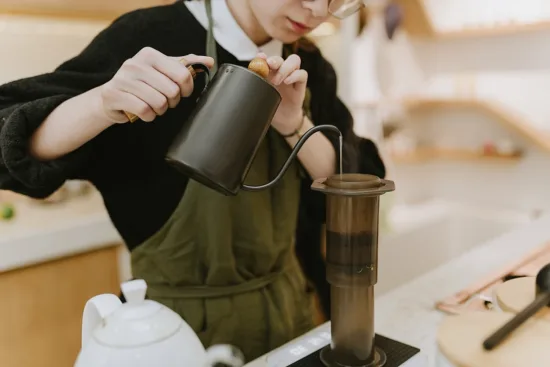
What Does Sexual Harassment in a Café Setting Look Like?
Harassment in a coffee shop can show up in many different ways, some obvious and others more subtle. Off the top of my head, I can come up with a few times I’ve been made to feel uncomfortable—customers staring at me from afar and talking about me with their friends, customers showing up and asking for my socials or phone number and getting upset when denied, and customers following me to my car or asking where I live or what time I get off of work.
My experience is not an isolated one; ask any barista in your life and I’m sure they’ve experienced their own share of unpleasant customer interactions. Keep in mind that I’m not saying that customers shouldn’t have relationships with their baristas; conversation between customers and employees is healthy and encouraged. But there’s a fine line between being friendly and making someone uncomfortable with unwanted attention.
How to Deal with Sexual Harassment as a Barista or Manager
Being on the clock while dealing with harassment can be tricky; on one hand, we as coffee workers want to protect ourselves and set firm boundaries. On the other hand, we’re often told that “the customer is always right,” and that we should put client comfort and satisfaction at the top of our priorities. Taking these conflicting ideas into consideration, how can we as coffee workers protect ourselves from customers who cross the line?
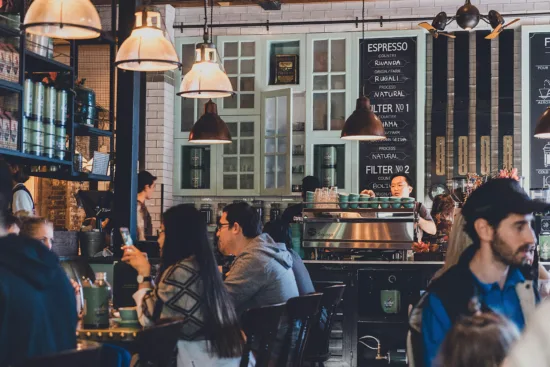
1. Use the Buddy System
Barista Magazine reader Emily Kasekamp, who manages a coffee shop in Ashburn, Va., emphasizes the importance of embracing a team mentality and constantly having other team members present or on call.
“I make sure to tell my staff that nothing in our shop is worth more than their safety or their life. I also make sure to show all staff where our camera aims so that they can (stay) within its range if something were to happen. We never run with fewer than two staff members present and prefer to have both inside the shop—we don’t run orders outside,” Emily shares. “The biggest safety concern I see as a manager is customers—who are often on the upper hand in a power dynamic—trying to intimidate our frequently underage or young, mostly femme staff … I have either myself or another manager/owner figure present for any shop events, especially events occurring during drinking hours.”
2. Trust Your Gut & Have a Team Code Word
Piggybacking off of Emily’s insight, in cases of harassment, don’t be afraid to exit the situation or get someone else involved if you have to—and, most importantly, don’t be afraid to label an encounter as uncomfortable. As service workers, it’s easy for us to slip into a “people-pleasing” mindset and write off our discomfort as an overreaction—but if something seems off to you, trust your gut and ask for help when you need it.
And acknowledging that someone is crossing your boundaries doesn’t have to cause a scene. When feeling uncomfortable around a customer, you can quietly let another staff member know you need help (code words shared amongst the team can help in these situations), and ask them to help you in any ways that make you feel safer—whether it’s taking your place at the bar for a moment, talking to the customer, or making sure you get home safely after your shift.
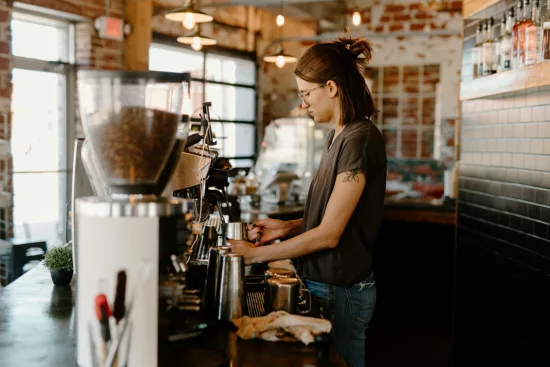
3. Be Present with Your Staff’s Concerns
Another Barista Magazine reader, Julius Morris, echoes Emily’s sentiments that, even though we’re often taught that the customer is always right, it’s up to coffee shop managers to be present for their staff’s needs. “(Baristas should) never work the bar alone, and if the employees are a minority, the shop owner needs to take (their) responsibility to provide a safe space seriously and not dismiss the concerns of (their) employees,” Julius states.
The Customer’s Role
When it comes to addressing sexual harassment, it isn’t just up to café workers to create a safe space. Customers, too, should work to help everyone present in the café feel safe—whether by holding those around them accountable or by reflecting on how their own actions, whether ill-intentioned or not, can be seen as crossing boundaries.
For example, in the uncomfortable situations I’ve found myself in as a barista, the customers involved may not have been aware of how their actions were coming across—which is why everyone, regardless of identity, can benefit from educating themselves on how to prevent gender-based violence and sexual harassment. Greater awareness can come from exploring topics like reading social cues, understanding and respecting consent, and considering perspectives from people of marginalized identities. It’s up to all of us to create a safer world for service workers and the world at large.
ABOUT THE AUTHOR
Emily Joy Meneses (she/they) is a writer and musician based in Los Angeles. Her hobbies include foraging, cortados, vintage synths, and connecting with her Filipino roots through music, art, food, and beverage.
Subscribe and More!
Out now: It’s the August + September 2024 issue of Barista Magazine! Read it for free with our digital edition. And for more than three years’ worth of issues, visit our digital edition archives here.
You can order a hard copy of the magazine through our online store here, or start a subscription for one year or two.



